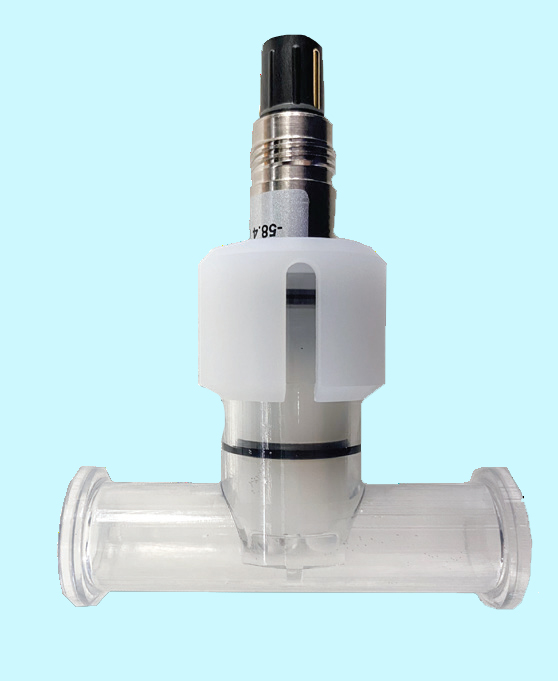Single Use In-line pH Sensor
PendoTECH
Background:
In downstream bioprocessing operations, monitoring and controlling the pH of a solution is critical to maintaining the stability and efficacy of large biomolecules. A pH sensor is a valuable tool used to determine the acidity or alkalinity of a solution. The electrochemical pH probe is a widely used method for measuring pH in these types of operations.
The electrochemical pH sensor uses two electrodes, a pH sensitive electrode and a reference electrode, and a temperature probe to determine the pH value of a solution. The potential difference between the two electrodes is measured and used to determine the number of hydrogen ions in the solution, which provides the pH value. Real-time measurement of pH is necessary in product purification operations, as solutions are flowing dynamically through a tube. The electrochemical pH probe offers accuracy and rapid response time, making it ideal for capturing rapid shifts in pH due to valve position changes or process changes.
To ensure accurate pH measurements, electrochemical pH sensor must be calibrated with accurately defined buffer standard solutions. Calibration values include both the zero point and the slope of the calibration line. The zero point is the point at which the pH electrode delivers zero potential, and the slope of the calibration line determines the accuracy of the sensor over its measuring range.
Benefits:
• Provides accurate and reliable pH measurement in
downstream bioprocessing operations
• Real-time measurement of pH helps to maintain stability
of large biomolecules in a specific pH range
• Rapid response time helps to capture rapid shifts in pH
due to process changes
• Calibration values printed on probe for easy entry into
pH monitor, eliminating need for calibration with buffers
• Closed system operation is not impacted, as there is no
need to expose pH sensor to buffer standards
• It may be re-used, however, in applications where cross
contamination is desired to be avoided.
The sensor/flow cell combination is designed specifically and optimized for in-line measurements:
• It is ideal for processes where cleaning the probe is
not practical post use
• Has a rapid response to change in pH conditions
CATEGORIES: Fluid Handling
| Catalog Number | Product Name | Action |
|---|---|---|
| PT-PH-L-025 | PendoTECH Single-Use In-Line pH Sensor- 1/4 inch hosebarb, Polysulfone. 2-years Shelf-Life | |
| PT-PH-L-5-5 | PendoTECH Single-Use In-Line pH Sensor - 3/4 inch sanitary flange, Polysulfone. 2-years Shelf-Life | |
| PT-PH-S-025 | PendoTECH Single-Use In-Line pH Sensor- 1/4 inch hosebarb, Polysulfone. 1-years Shelf-Life | |
| PT-PH-S-5-5 | PendoTECH Single-Use In-Line pH Sensor - 3/4 inch sanitary flange, Polysulfone. 1-years Shelf-Life |
Single Use In-line pH Sensor
PendoTECH
Background:
In downstream bioprocessing operations, monitoring and controlling the pH of a solution is critical to maintaining the stability and efficacy of large biomolecules. A pH sensor is a valuable tool used to determine the acidity or alkalinity of a solution. The electrochemical pH probe is a widely used method for measuring pH in these types of operations.
The electrochemical pH sensor uses two electrodes, a pH sensitive electrode and a reference electrode, and a temperature probe to determine the pH value of a solution. The potential difference between the two electrodes is measured and used to determine the number of hydrogen ions in the solution, which provides the pH value. Real-time measurement of pH is necessary in product purification operations, as solutions are flowing dynamically through a tube. The electrochemical pH probe offers accuracy and rapid response time, making it ideal for capturing rapid shifts in pH due to valve position changes or process changes.
To ensure accurate pH measurements, electrochemical pH sensor must be calibrated with accurately defined buffer standard solutions. Calibration values include both the zero point and the slope of the calibration line. The zero point is the point at which the pH electrode delivers zero potential, and the slope of the calibration line determines the accuracy of the sensor over its measuring range.
Benefits:
• Provides accurate and reliable pH measurement in
downstream bioprocessing operations
• Real-time measurement of pH helps to maintain stability
of large biomolecules in a specific pH range
• Rapid response time helps to capture rapid shifts in pH
due to process changes
• Calibration values printed on probe for easy entry into
pH monitor, eliminating need for calibration with buffers
• Closed system operation is not impacted, as there is no
need to expose pH sensor to buffer standards
• It may be re-used, however, in applications where cross
contamination is desired to be avoided.
The sensor/flow cell combination is designed specifically and optimized for in-line measurements:
• It is ideal for processes where cleaning the probe is
not practical post use
• Has a rapid response to change in pH conditions
CATEGORIES: Fluid Handling
| Catalog Number | Product Name |
|---|---|
| PT-PH-L-025 | PendoTECH Single-Use In-Line pH Sensor- 1/4 inch hosebarb, Polysulfone. 2-years Shelf-Life |
| PT-PH-L-5-5 | PendoTECH Single-Use In-Line pH Sensor - 3/4 inch sanitary flange, Polysulfone. 2-years Shelf-Life |
| PT-PH-S-025 | PendoTECH Single-Use In-Line pH Sensor- 1/4 inch hosebarb, Polysulfone. 1-years Shelf-Life |
| PT-PH-S-5-5 | PendoTECH Single-Use In-Line pH Sensor - 3/4 inch sanitary flange, Polysulfone. 1-years Shelf-Life |


